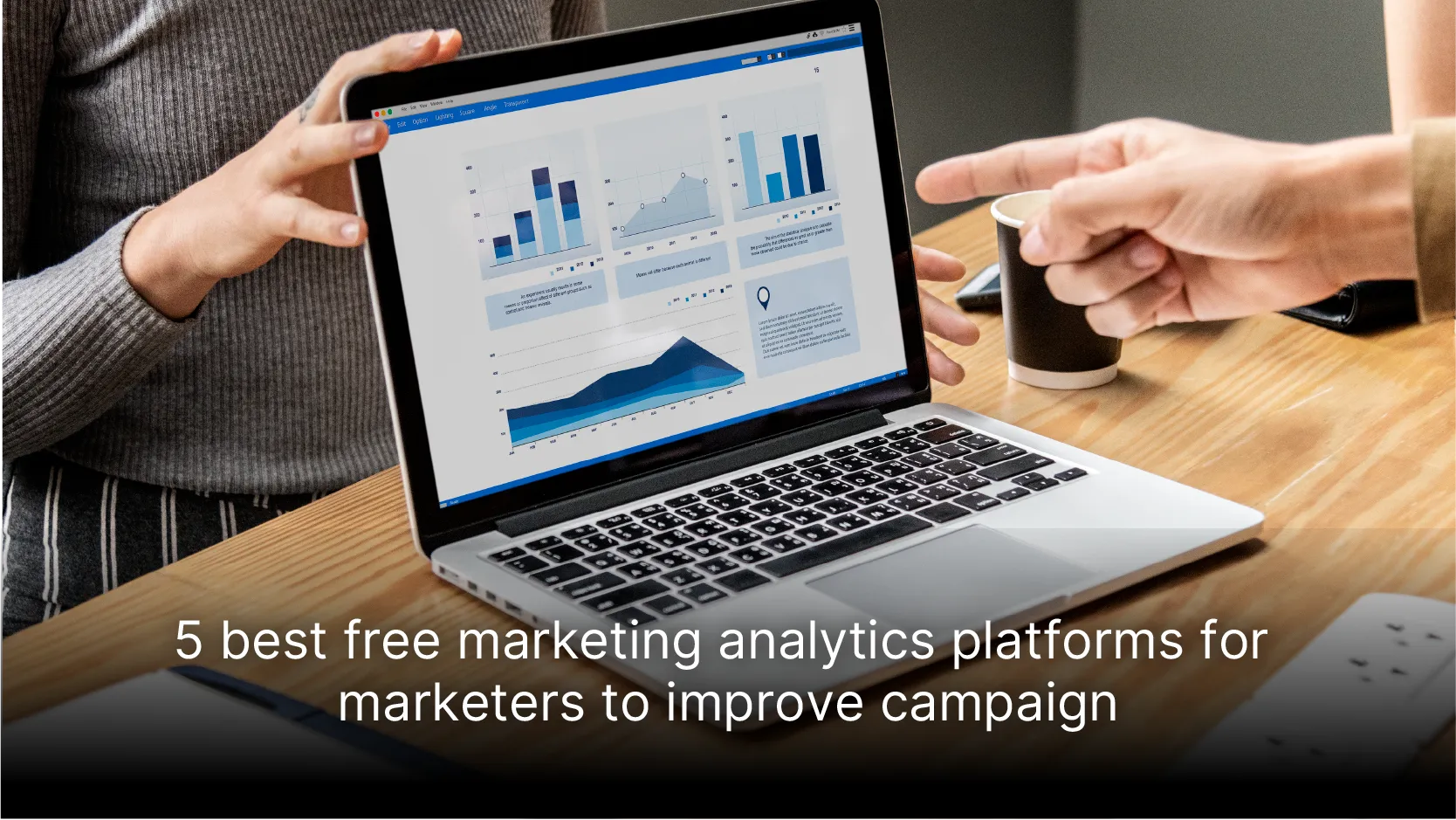Guess what’s the most underrated asset for a business. It’s data. About 87% of marketers say so. Even after that, 40% of marketers find it most challenging to prove their marketing ROI. Now we know data is the key but how do you use that data and importantly how do you analyze it?
A marketing analytics platform is the answer. These are tools that help people gather, analyze, and basically come to a conclusion about your campaigns. Read on to find free software.
What is marketing analytics software?

Marketing analytics software is a specialized tool to help marketers or businesses with data collection, analysis, and interpretation. These tools eliminate tedious tasks like manual logging in, uploading data in complex spreadsheets, exporting, etc.
Marketing analytics platforms allow marketing teams to understand their marketing initiatives’ performance using various tools. Teams may monitor and extract data in real time for customer support analysis across multiple buyer journeys and periods.
It allows:
- easy assessment and performance of marketing campaigns
- optimize marketing strategy for high ROI
- understand consumer behavior
If you don’t know where to start with a marketing analytics platform, answer these questions:
- Which marketing campaigns are our top priorities?
- Which marketing campaigns are ineffective and ought to be discontinued?
- What should we be focusing on or changing about our strategy?
Also Read: What is Containerization and Why is it Important?
5 best free marketing analytics platforms for marketers to improve campaign

Below are some free marketing analytics tools you should consider adding to your martech stack.
1. Google Analytics
Google Analytics is the OG marketing analytics platform known to marketers kind.
Owned by one of the tech giants, Google, it also has integrated data visualization tools in Google Data Studio.
The best part is that all these services are free, so anyone can analyze their marketing data and website traffic.
Who needs this? Anyone who needs detailed information about website traffic or audience, such as internal search statistics, traffic sources, audience demographics, and more, may find Google Analytics useful.
Integrations: Installing Google Analytics on a website or landing page is quick and easy. Marketers can better understand and act on their Google Analytics data due to integrations with a variety of marketing and sales analytics solutions.
Key Features
- Cross-Platform Reporting: Google Analytics allows cross-platform marketing attribution reporting, which offers businesses the opportunity the opportunity to evaluate each customer touchpoint in their marketing funnel. This shows how each channel leads to conversions.
- Integration With Other Marketing Tools: It seamlessly integrates with other Google products such as Google Search Console and Google Ads. Marketers can analyze the entire user engagement life cycle, leading to better decision-making.
- UTM Tag automated: Google Analytics automatically tags emails sent through the Marketing Cloud with UTM parameters, allowing businesses to track and analyze the effectiveness of their email campaigns.
2. Mailchimp
Mailchimp is the go-to email marketing and automation platform, popular among entrepreneurs for its user-friendly interface and comprehensive features. From AI-driven content optimization to marketing CRM, Mailchimp offers everything needed to craft effective email campaigns and grow your business.
Who needs it? Small businesses, entrepreneurs, and marketers looking for a versatile tool to manage email campaigns, automate marketing, and gain insights from data.
Integrations: Mailchimp integrates seamlessly with over 300 tools, including Shopify, QuickBooks, and Facebook, making it easy to connect your marketing efforts across platforms.
Key Features
- Marketing Automation: Create automated workflows to re-engage customers effortlessly.
- Creative Assistant: Access and reuse creative assets across different channels.
- AI Tools: Use Content Optimizer for AI-powered copy and imagery enhancements.
- Insights and Analytics: Leverage data-driven insights to refine your marketing strategies.
3. Mixpanel
Mixpanel stands out as a sophisticated product and marketing analytics platform, offering in-depth insights into user behavior.
It helps businesses optimize their marketing funnel and understand customer interactions through advanced data analysis.
Who needs it? Businesses and data teams that require detailed analytics to track user behavior, optimize conversion rates, and improve product experiences.
Integrations: Mixpanel supports integration with various platforms like AWS, Google Cloud, and marketing tools like Mailchimp and Slack, ensuring smooth data flow and analysis.
Key Features
- No-SQL Complex Queries: Create intricate queries without needing SQL knowledge.
- Retroactive Funnel Building: Analyze past data and refine user paths.
- Data Lake Integration: Access comprehensive data analysis by connecting to data lakes.
4. HubSpot
HubSpot is a versatile CRM and marketing platform that provides tools for marketing automation, sales, and customer service. It’s known for its user-friendly design and robust features, making it a one-stop solution for inbound marketing.
Who needs it? Marketers and businesses of all sizes seek an integrated platform for managing marketing campaigns, sales processes, and customer relationships.
Integrations: HubSpot integrates with a wide range of third-party tools and platforms, enhancing its capability as a central hub for all marketing and sales activities.
Key Features
- CRM and Marketing Automation: Streamline customer relationship management and automate marketing tasks.
- Content Management: Easily manage and optimize website content.
- Analytics and Reporting: Access detailed reports to measure performance and ROI.
5. Fathom Analytics
Fathom Analytics offers a privacy-focused alternative to traditional web analytics tools, providing essential insights without compromising user privacy. It’s ideal for businesses that prioritize compliance with data protection regulations.
Who needs it? Businesses and website owners need basic yet powerful analytics without tracking personal data, ensuring compliance with privacy laws.
Integrations: Fathom Analytics integrates smoothly with various platforms, offering a straightforward setup process and easy access to vital website performance metrics.
Key Features
- Privacy-Centric Design: Complies with GDPR and CCPA by not tracking personal data.
- Simple Reporting: Provides clear and actionable data without overwhelming complexity.
- Easy Integration: Quick setup with various platforms for hassle-free analytics.
These descriptions offer a concise overview of each tool’s capabilities, making it easier to determine which platform best suits your needs.
Do any marketing automation platforms use Google Analytics tracking tags?
Yes, many marketing automation platforms use Google Analytics tracking tags to enhance their capabilities in tracking and analyzing marketing performance. Apart from the ones mentioned above, Marketo, Pardot, etc also offer this feature.
Such implementation allows marketers to collect valuable data on user engagement, enabling real-time optimization of marketing strategies.
This integration provides insights into campaign effectiveness, helping businesses make informed, data-driven decisions. It ultimately enhances overall marketing performance by leveraging precise user behavior analytics.
Go all board on that campaign
Now that you have an idea about free marketing analytics platforms, there really is no excuse. Shuffle through each tool and pick one that better fits your business goals.

